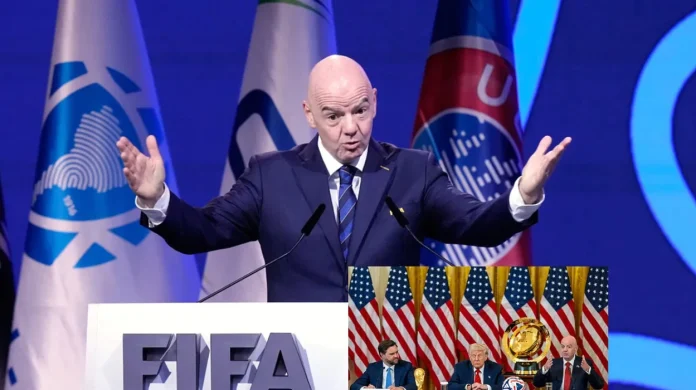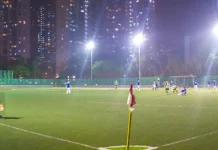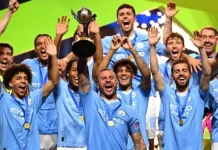The 2026 FIFA World Cup, slated to be hosted jointly by the United States, Canada, and Mexico, has become embroiled in a deepening crisis following revelations of collusion between FIFA President Gianni Infantino and former U.S. President Donald Trump. This scandal has ignited widespread calls for boycotts, accusations of political exploitation, and fears of systemic human rights violations, casting a shadow over what was intended to be a landmark celebration of global football. Below is a critical analysis of the escalating controversy, its implications for FIFA, and the broader socio-political stakes.
The Trump-FIFA Alliance
The roots of the crisis trace back to March 2025, when Trump signed an executive order establishing a White House Task Force for the 2026 World Cup, flanked by Infantino in a highly publicized Oval Office ceremony. The task force, ostensibly designed to promote “economic development and tourism,” quickly drew scrutiny for its overt political overtones. Trump, who has repeatedly weaponized sports for nationalist agendas, framed the partnership as a vehicle to amplify U.S. dominance: “Tension is beneficial; it enhances the excitement,” he quipped, referencing ongoing trade disputes with Canada and Mexico.
Infantino, meanwhile, touted economic benefits—$40 billion in projected revenue and 200,000 jobs—while avoiding substantive discussions about human rights2. His alignment with Trump deepened in May 2025, when he skipped a critical FIFA congress to accompany Trump on a controversial trip to Qatar and Saudi Arabia, both accused of sportswashing and human rights abuses. The move triggered a walkout by UEFA officials, who condemned Infantino’s “abuse of power for political gain”.
Human Rights Concerns: A Hostile Environment for Players and Fans
Human Rights Watch (HRW) and advocacy groups have sounded alarms over the U.S.’s suitability as a host nation, citing Trump’s draconian immigration policies and their potential impact on World Cup participants and attendees.
Key Issues Highlighted by HRW:
- Travel Restrictions: Visitors from 43 countries face heightened scrutiny under Trump’s visa policies, including requirements to disclose sex assigned at birth—a rule that erases transgender and non-binary identities.
- Border Detentions: Even with valid visas and match tickets, fans and athletes risk interrogation, social media screening, and detention for expressing dissent against Trump’s policies.
- Deportation Threats: The administration has actively revoked visas of pro-Palestinian activists, with Vice President J.D. Vance warning attendees not to overstay: “When the visa is up, they’ll go home. Otherwise, we’ll have to talk to Homeland Security”.
HRW’s Minky Worden accused FIFA of enabling a “hostile environment,” stating, “These policies contravene FIFA’s human rights responsibilities”. The U.S. Travel Association reports that international tourism has already declined by 12% since 2023 due to these measures, raising doubts about achieving the projected 3.7 million visitors.
Political Exploitation and Authoritarian Ties
Critics argue that the Trump-Infantino alliance exemplifies FIFA’s broader capitulation to authoritarian regimes. Infantino’s courtship of Trump—a figure embroiled in legal battles over election interference and inciting insurrection—has drawn comparisons to FIFA’s dealings with Qatar and Saudi Arabia, hosts of the 2022 and 2034 World Cups, respectively.
Controversial Actions and Reactions:
- Qatar and Saudi Arabia Trips: Infantino’s decision to prioritize photo-ops with Trump over FIFA governance duties sparked outrage. UEFA’s press release condemned the “private political interests” driving his agenda, while Norwegian FA head Lise Klaveness lamented his absence from preparatory meetings.
- Sportswashing Allegations: A senior football source warned that Trump would exploit the World Cup to “promote his political ideology,” likening it to Saudi Arabia’s use of sports to divert attention from human rights abuses.
- Public Mockery: Social media users derided Trump and Infantino for their “love of money, thirst for power, and rampant narcissism,” with memes dubbing the event the “MAGA World Cup”.
Financial and Reputational Risks for FIFA
The boycott movement, spearheaded by groups like Boycott USA 2026, threatens to cripple FIFA financially while further eroding its credibility.
Economic Stakes:
- Sponsorship Losses: U.S. corporations account for $500–600 million of FIFA’s sponsorship revenue. Major brands, wary of association with Trump’s policies, are reportedly reconsidering commitments.
- TV Rights and Tourism: A partial boycott could slash broadcast deals and ticket sales. FIFA’s $40 billion revenue projection hinges on full stadiums, yet MetLife Stadium (the final venue) has already seen a 15% drop in pre-sales since May 2025.
- Relocation Costs: Moving matches to Canada and Mexico would require renegotiating contracts and infrastructure investments, with estimates suggesting a $1.2 billion price tag.
Reputational Damage:
FIFA’s decision to award the 2034 World Cup to Saudi Arabia—a bid unopposed due to Infantino’s backroom dealings—has already strained relations with European federations. The 2026 crisis risks cementing FIFA’s image as a body prioritizing profit over principles. UEFA’s public rebuke—”football’s interests appear secondary”—underscores this perception.
Stakeholder Reactions and the Boycott Movement
The backlash has unified disparate groups, from human rights advocates to football governing bodies, in demanding accountability.
UEFA accused Infantino of “abuse of power” and withdrew from FIFA congresses, signaling a potential rift in global football governance. Human Rights Watch urged FIFA to reconsider the U.S. as a host unless safety guarantees are met, highlighting “systemic discrimination” at borders. National Travel Advisories of Canada, France, Germany, and others have warned citizens about U.S. entry risks, with Ireland’s advisory bluntly stating, “Exercise extreme caution”. Media and Fans outlets like The Nation and Rolling Stone have endorsed boycotts, while fan forums buzz with calls to “refuse to legitimize Trump’s agenda”.
The Path Forward:
Proposals to shift all matches to Canada and Mexico are gaining traction, though logistical hurdles remain. Concacaf officials privately acknowledge that such a move would require FIFA to invoke its “force majeure” clause—a step laden with legal and financial risks.
The 2026 World Cup scandal represents a pivotal moment for FIFA. Infantino’s alignment with Trump—a figure synonymous with division and authoritarianism—has exposed the organization’s vulnerability to political manipulation and profit-driven decision-making. With trust in FIFA at historic lows, the boycott movement transcends sports, reflecting broader societal rejections of xenophobia and corruption.
FIFA now faces a stark choice: Uphold its statutory commitment to “non-discrimination and human rights” by relocating the tournament, or proceed with the U.S. as a host and risk irreversible reputational and financial damage. Either outcome will redefine FIFA’s role in a world where sports and politics are increasingly inseparable.
As Minky Worden of HRW starkly warned: “Infantino’s legacy will be judged by whether he sides with human dignity or political opportunism”. For millions of fans and athletes, the stakes could not be higher.













